Analyzing Social Determinants of Mental Health for Indigenous People
VerifiedAdded on 2023/06/05
|9
|2136
|155
Essay
AI Summary
This essay examines the impact of social determinants on the mental health of Indigenous Australians, focusing on Aboriginal and Torres Strait Islander people. It highlights the health disparities they face due to historical trauma, systemic discrimination, and socioeconomic disadvantages. The paper discusses how factors like poverty, racism, and limited access to healthcare contribute to higher rates of mental disorders such as depression, anxiety, and substance abuse within these communities. It emphasizes the need for addressing these social determinants to improve the mental well-being of Indigenous Australians and reduce health inequalities, advocating for awareness and interventions to combat discrimination and promote equitable access to resources and support.
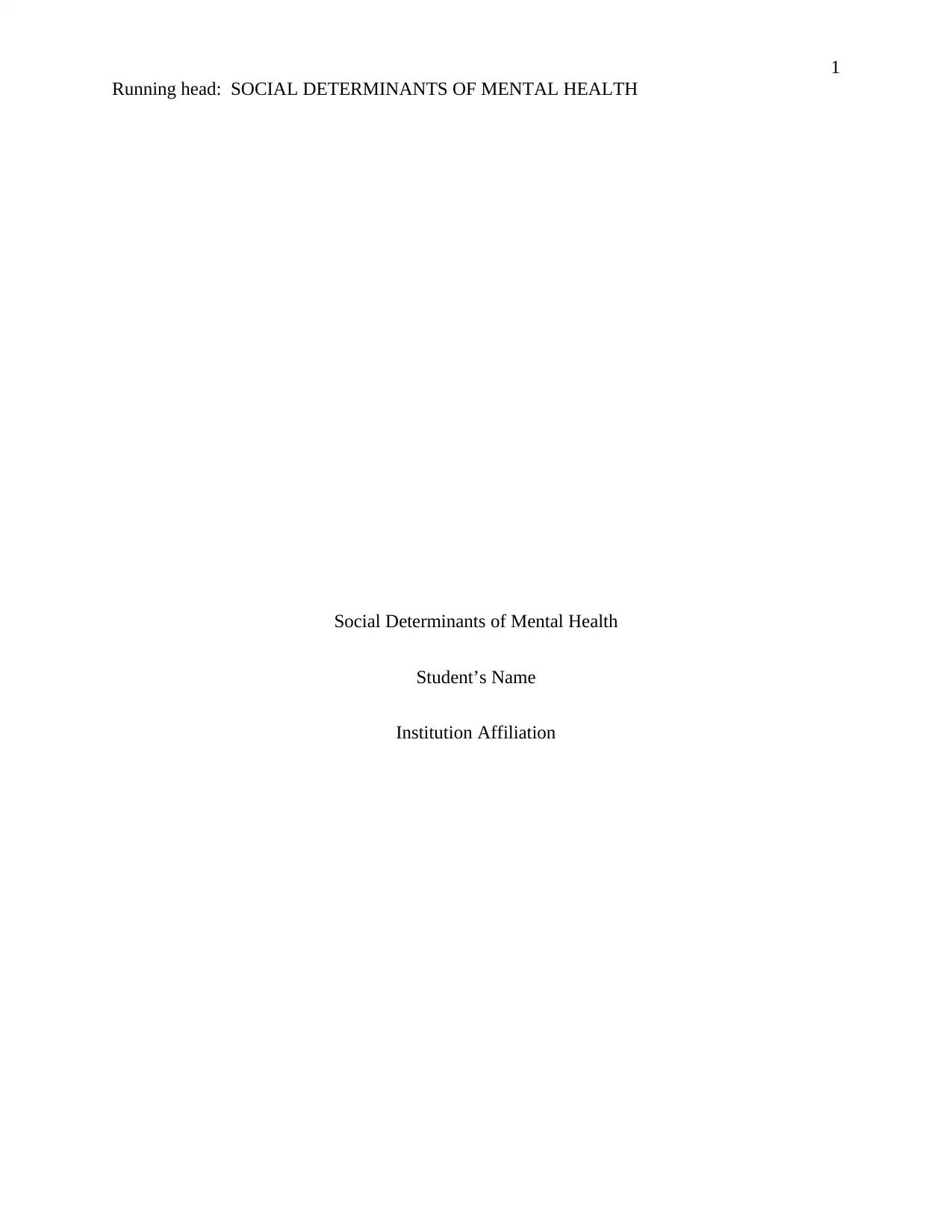
1
Running head: SOCIAL DETERMINANTS OF MENTAL HEALTH
Social Determinants of Mental Health
Student’s Name
Institution Affiliation
Running head: SOCIAL DETERMINANTS OF MENTAL HEALTH
Social Determinants of Mental Health
Student’s Name
Institution Affiliation
Paraphrase This Document
Need a fresh take? Get an instant paraphrase of this document with our AI Paraphraser
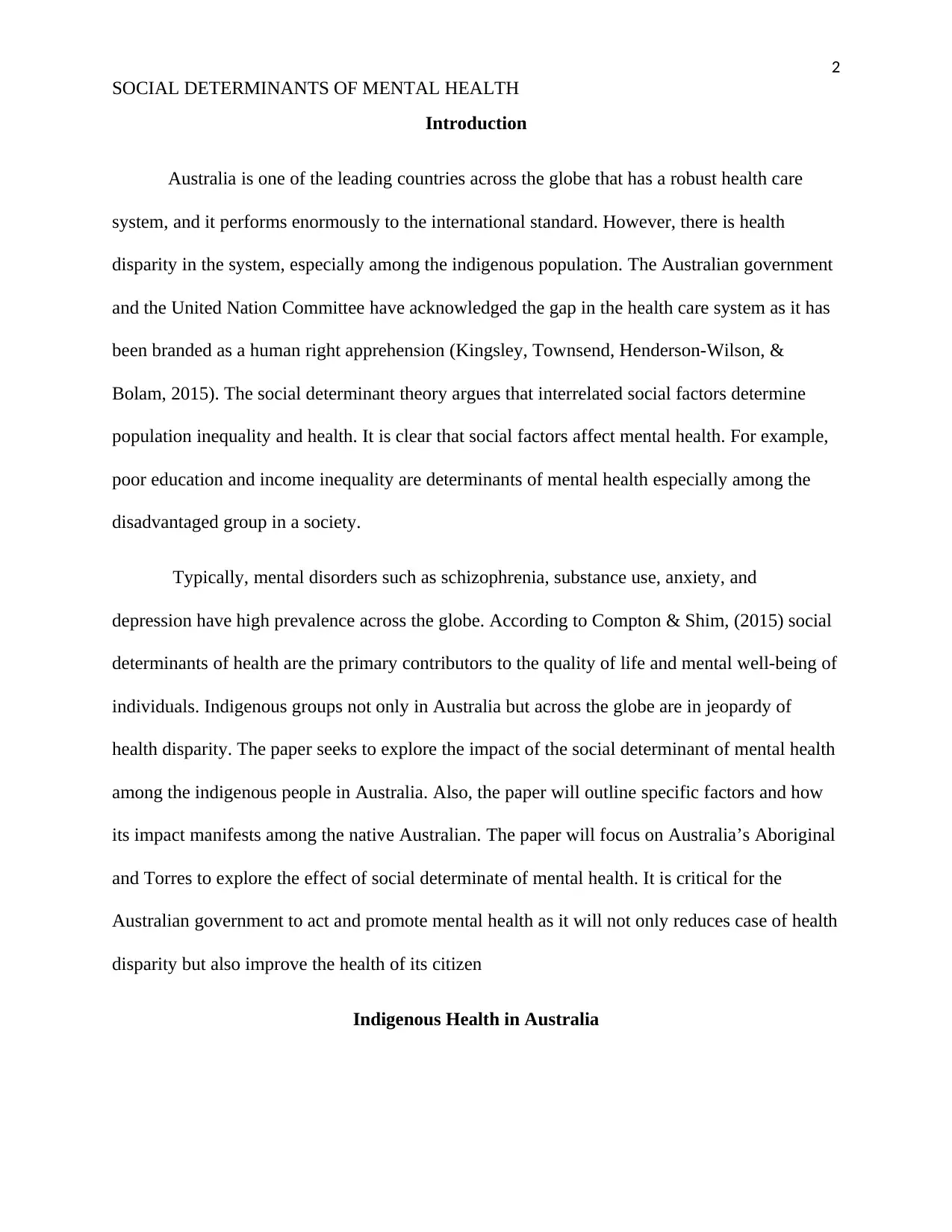
2
SOCIAL DETERMINANTS OF MENTAL HEALTH
Introduction
Australia is one of the leading countries across the globe that has a robust health care
system, and it performs enormously to the international standard. However, there is health
disparity in the system, especially among the indigenous population. The Australian government
and the United Nation Committee have acknowledged the gap in the health care system as it has
been branded as a human right apprehension (Kingsley, Townsend, Henderson-Wilson, &
Bolam, 2015). The social determinant theory argues that interrelated social factors determine
population inequality and health. It is clear that social factors affect mental health. For example,
poor education and income inequality are determinants of mental health especially among the
disadvantaged group in a society.
Typically, mental disorders such as schizophrenia, substance use, anxiety, and
depression have high prevalence across the globe. According to Compton & Shim, (2015) social
determinants of health are the primary contributors to the quality of life and mental well-being of
individuals. Indigenous groups not only in Australia but across the globe are in jeopardy of
health disparity. The paper seeks to explore the impact of the social determinant of mental health
among the indigenous people in Australia. Also, the paper will outline specific factors and how
its impact manifests among the native Australian. The paper will focus on Australia’s Aboriginal
and Torres to explore the effect of social determinate of mental health. It is critical for the
Australian government to act and promote mental health as it will not only reduces case of health
disparity but also improve the health of its citizen
Indigenous Health in Australia
SOCIAL DETERMINANTS OF MENTAL HEALTH
Introduction
Australia is one of the leading countries across the globe that has a robust health care
system, and it performs enormously to the international standard. However, there is health
disparity in the system, especially among the indigenous population. The Australian government
and the United Nation Committee have acknowledged the gap in the health care system as it has
been branded as a human right apprehension (Kingsley, Townsend, Henderson-Wilson, &
Bolam, 2015). The social determinant theory argues that interrelated social factors determine
population inequality and health. It is clear that social factors affect mental health. For example,
poor education and income inequality are determinants of mental health especially among the
disadvantaged group in a society.
Typically, mental disorders such as schizophrenia, substance use, anxiety, and
depression have high prevalence across the globe. According to Compton & Shim, (2015) social
determinants of health are the primary contributors to the quality of life and mental well-being of
individuals. Indigenous groups not only in Australia but across the globe are in jeopardy of
health disparity. The paper seeks to explore the impact of the social determinant of mental health
among the indigenous people in Australia. Also, the paper will outline specific factors and how
its impact manifests among the native Australian. The paper will focus on Australia’s Aboriginal
and Torres to explore the effect of social determinate of mental health. It is critical for the
Australian government to act and promote mental health as it will not only reduces case of health
disparity but also improve the health of its citizen
Indigenous Health in Australia

3
SOCIAL DETERMINANTS OF MENTAL HEALTH
Recent studies have shown that Australia’s Aboriginal and Torres people are poor when
they are compared to the rest of the Australian population. For instance, Aboriginal and Torres
Islander people don’t have equal opportunities to improve their living standards. Therefore, the
social, economic drawback experienced by the indigenous group in Australia places them at a
higher risk of exposure to mental disorders. According to Durey, (2015), the indigenous group
across the globe don’t enjoy equal access to health infrastructure and primary health care
services thus, making them vulnerable to mental disorders. In history, Aboriginal and Torres
Islander people experienced the traumatic event which had a severe impact on their mental and
social well-being. For example, they were evicted from their land and the removal of their
children from their homelands and families. It is undeniable that health disparity among the
indigenous group in Australia is allied with systematic discrimination (Parker, & Milroy, 2014).
According to the world health organization, the minority group in society are at great risk of
mental illness because of high susceptibility and exposure to unfavorable environmental, social
and economic conditions.
Moreover, risk factors for mental illness are linked with social inequality. For example,
Aboriginal and Torres Islander people are experiencing a lot of stressful situation such as
discrimination, poverty, overcrowded houses, and substance abuse which makes them vulnerable
to mental disorders. Recent studies have shown that anxiety and depression are spread according
to an incline of social and economic disadvantage across the society (Panaretto, Wenitong,
Button, & Ring, 2014). Usually, the indigenous group in society suffer excessively from mental
illness. Typically, there is a link between an individual’s economic and social status and
psychological well-being because poverty is connected with poor mental health.
Social Determinates on Mental Health
SOCIAL DETERMINANTS OF MENTAL HEALTH
Recent studies have shown that Australia’s Aboriginal and Torres people are poor when
they are compared to the rest of the Australian population. For instance, Aboriginal and Torres
Islander people don’t have equal opportunities to improve their living standards. Therefore, the
social, economic drawback experienced by the indigenous group in Australia places them at a
higher risk of exposure to mental disorders. According to Durey, (2015), the indigenous group
across the globe don’t enjoy equal access to health infrastructure and primary health care
services thus, making them vulnerable to mental disorders. In history, Aboriginal and Torres
Islander people experienced the traumatic event which had a severe impact on their mental and
social well-being. For example, they were evicted from their land and the removal of their
children from their homelands and families. It is undeniable that health disparity among the
indigenous group in Australia is allied with systematic discrimination (Parker, & Milroy, 2014).
According to the world health organization, the minority group in society are at great risk of
mental illness because of high susceptibility and exposure to unfavorable environmental, social
and economic conditions.
Moreover, risk factors for mental illness are linked with social inequality. For example,
Aboriginal and Torres Islander people are experiencing a lot of stressful situation such as
discrimination, poverty, overcrowded houses, and substance abuse which makes them vulnerable
to mental disorders. Recent studies have shown that anxiety and depression are spread according
to an incline of social and economic disadvantage across the society (Panaretto, Wenitong,
Button, & Ring, 2014). Usually, the indigenous group in society suffer excessively from mental
illness. Typically, there is a link between an individual’s economic and social status and
psychological well-being because poverty is connected with poor mental health.
Social Determinates on Mental Health
⊘ This is a preview!⊘
Do you want full access?
Subscribe today to unlock all pages.

Trusted by 1+ million students worldwide
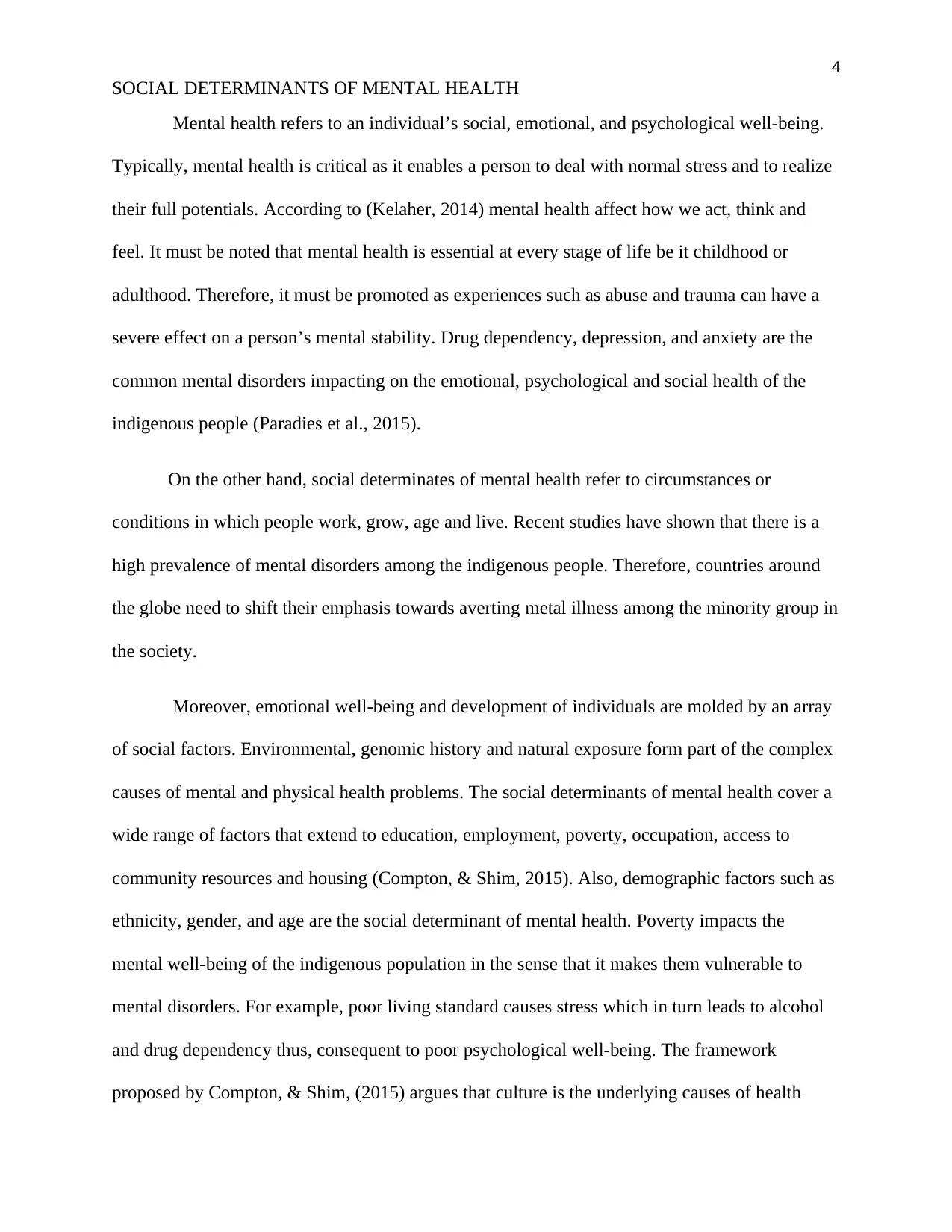
4
SOCIAL DETERMINANTS OF MENTAL HEALTH
Mental health refers to an individual’s social, emotional, and psychological well-being.
Typically, mental health is critical as it enables a person to deal with normal stress and to realize
their full potentials. According to (Kelaher, 2014) mental health affect how we act, think and
feel. It must be noted that mental health is essential at every stage of life be it childhood or
adulthood. Therefore, it must be promoted as experiences such as abuse and trauma can have a
severe effect on a person’s mental stability. Drug dependency, depression, and anxiety are the
common mental disorders impacting on the emotional, psychological and social health of the
indigenous people (Paradies et al., 2015).
On the other hand, social determinates of mental health refer to circumstances or
conditions in which people work, grow, age and live. Recent studies have shown that there is a
high prevalence of mental disorders among the indigenous people. Therefore, countries around
the globe need to shift their emphasis towards averting metal illness among the minority group in
the society.
Moreover, emotional well-being and development of individuals are molded by an array
of social factors. Environmental, genomic history and natural exposure form part of the complex
causes of mental and physical health problems. The social determinants of mental health cover a
wide range of factors that extend to education, employment, poverty, occupation, access to
community resources and housing (Compton, & Shim, 2015). Also, demographic factors such as
ethnicity, gender, and age are the social determinant of mental health. Poverty impacts the
mental well-being of the indigenous population in the sense that it makes them vulnerable to
mental disorders. For example, poor living standard causes stress which in turn leads to alcohol
and drug dependency thus, consequent to poor psychological well-being. The framework
proposed by Compton, & Shim, (2015) argues that culture is the underlying causes of health
SOCIAL DETERMINANTS OF MENTAL HEALTH
Mental health refers to an individual’s social, emotional, and psychological well-being.
Typically, mental health is critical as it enables a person to deal with normal stress and to realize
their full potentials. According to (Kelaher, 2014) mental health affect how we act, think and
feel. It must be noted that mental health is essential at every stage of life be it childhood or
adulthood. Therefore, it must be promoted as experiences such as abuse and trauma can have a
severe effect on a person’s mental stability. Drug dependency, depression, and anxiety are the
common mental disorders impacting on the emotional, psychological and social health of the
indigenous people (Paradies et al., 2015).
On the other hand, social determinates of mental health refer to circumstances or
conditions in which people work, grow, age and live. Recent studies have shown that there is a
high prevalence of mental disorders among the indigenous people. Therefore, countries around
the globe need to shift their emphasis towards averting metal illness among the minority group in
the society.
Moreover, emotional well-being and development of individuals are molded by an array
of social factors. Environmental, genomic history and natural exposure form part of the complex
causes of mental and physical health problems. The social determinants of mental health cover a
wide range of factors that extend to education, employment, poverty, occupation, access to
community resources and housing (Compton, & Shim, 2015). Also, demographic factors such as
ethnicity, gender, and age are the social determinant of mental health. Poverty impacts the
mental well-being of the indigenous population in the sense that it makes them vulnerable to
mental disorders. For example, poor living standard causes stress which in turn leads to alcohol
and drug dependency thus, consequent to poor psychological well-being. The framework
proposed by Compton, & Shim, (2015) argues that culture is the underlying causes of health
Paraphrase This Document
Need a fresh take? Get an instant paraphrase of this document with our AI Paraphraser
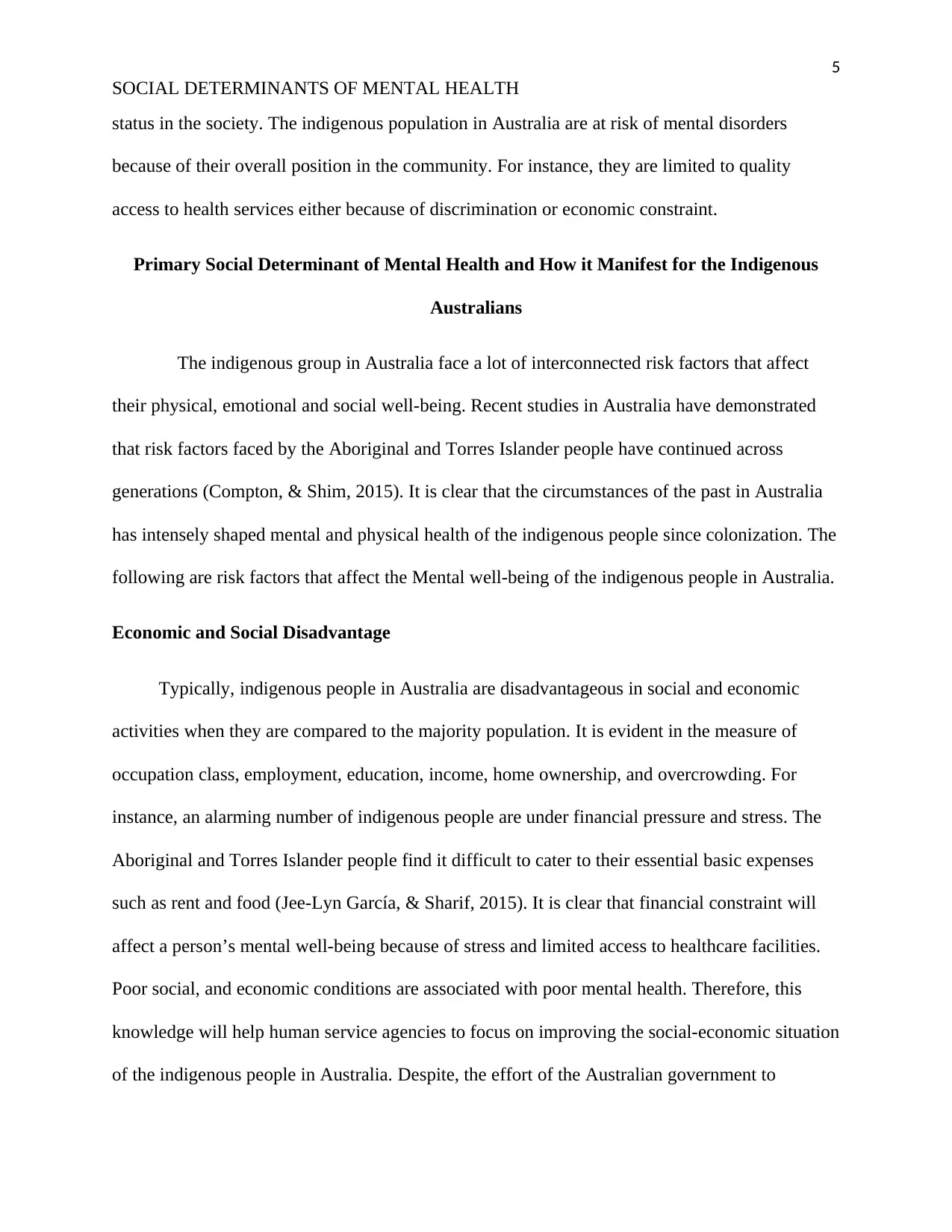
5
SOCIAL DETERMINANTS OF MENTAL HEALTH
status in the society. The indigenous population in Australia are at risk of mental disorders
because of their overall position in the community. For instance, they are limited to quality
access to health services either because of discrimination or economic constraint.
Primary Social Determinant of Mental Health and How it Manifest for the Indigenous
Australians
The indigenous group in Australia face a lot of interconnected risk factors that affect
their physical, emotional and social well-being. Recent studies in Australia have demonstrated
that risk factors faced by the Aboriginal and Torres Islander people have continued across
generations (Compton, & Shim, 2015). It is clear that the circumstances of the past in Australia
has intensely shaped mental and physical health of the indigenous people since colonization. The
following are risk factors that affect the Mental well-being of the indigenous people in Australia.
Economic and Social Disadvantage
Typically, indigenous people in Australia are disadvantageous in social and economic
activities when they are compared to the majority population. It is evident in the measure of
occupation class, employment, education, income, home ownership, and overcrowding. For
instance, an alarming number of indigenous people are under financial pressure and stress. The
Aboriginal and Torres Islander people find it difficult to cater to their essential basic expenses
such as rent and food (Jee-Lyn García, & Sharif, 2015). It is clear that financial constraint will
affect a person’s mental well-being because of stress and limited access to healthcare facilities.
Poor social, and economic conditions are associated with poor mental health. Therefore, this
knowledge will help human service agencies to focus on improving the social-economic situation
of the indigenous people in Australia. Despite, the effort of the Australian government to
SOCIAL DETERMINANTS OF MENTAL HEALTH
status in the society. The indigenous population in Australia are at risk of mental disorders
because of their overall position in the community. For instance, they are limited to quality
access to health services either because of discrimination or economic constraint.
Primary Social Determinant of Mental Health and How it Manifest for the Indigenous
Australians
The indigenous group in Australia face a lot of interconnected risk factors that affect
their physical, emotional and social well-being. Recent studies in Australia have demonstrated
that risk factors faced by the Aboriginal and Torres Islander people have continued across
generations (Compton, & Shim, 2015). It is clear that the circumstances of the past in Australia
has intensely shaped mental and physical health of the indigenous people since colonization. The
following are risk factors that affect the Mental well-being of the indigenous people in Australia.
Economic and Social Disadvantage
Typically, indigenous people in Australia are disadvantageous in social and economic
activities when they are compared to the majority population. It is evident in the measure of
occupation class, employment, education, income, home ownership, and overcrowding. For
instance, an alarming number of indigenous people are under financial pressure and stress. The
Aboriginal and Torres Islander people find it difficult to cater to their essential basic expenses
such as rent and food (Jee-Lyn García, & Sharif, 2015). It is clear that financial constraint will
affect a person’s mental well-being because of stress and limited access to healthcare facilities.
Poor social, and economic conditions are associated with poor mental health. Therefore, this
knowledge will help human service agencies to focus on improving the social-economic situation
of the indigenous people in Australia. Despite, the effort of the Australian government to
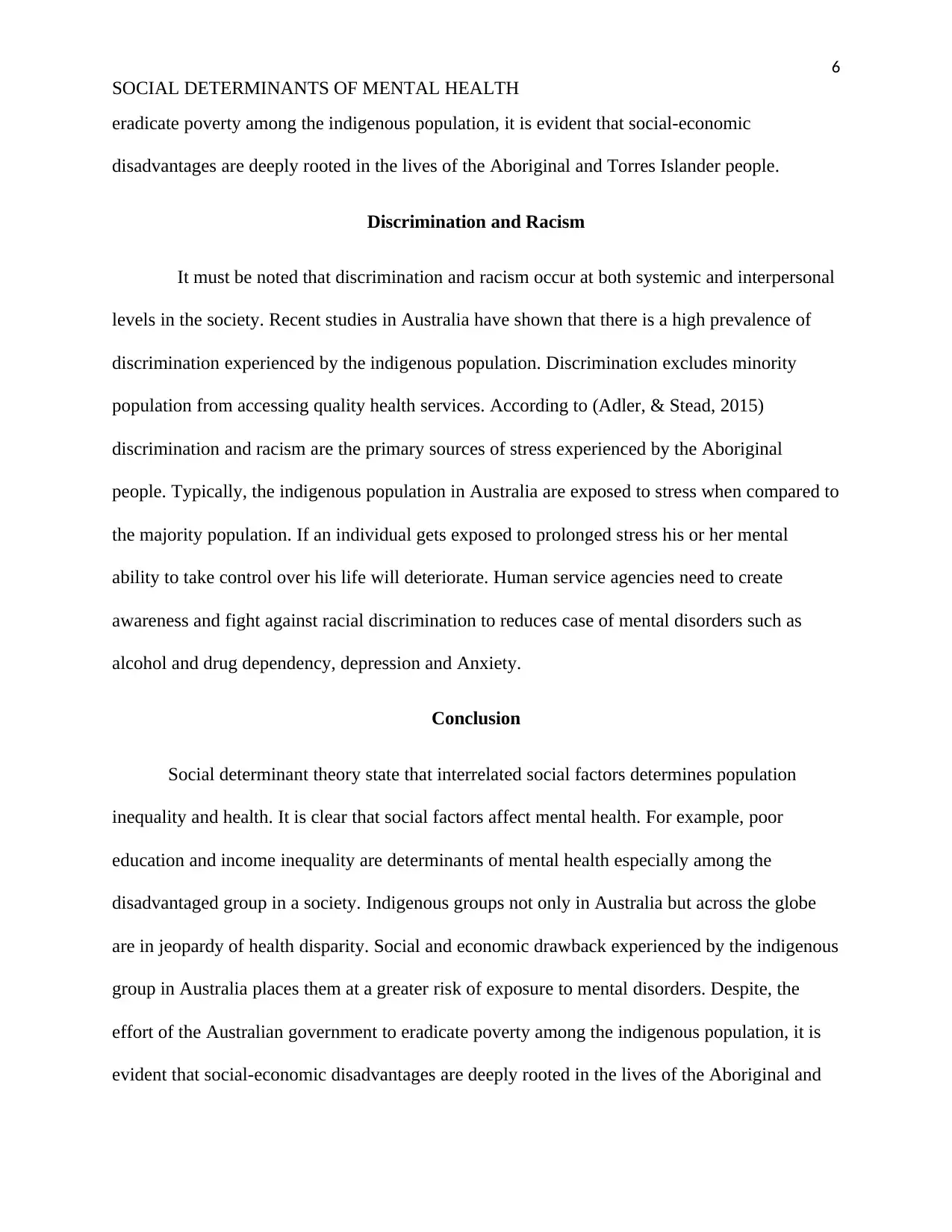
6
SOCIAL DETERMINANTS OF MENTAL HEALTH
eradicate poverty among the indigenous population, it is evident that social-economic
disadvantages are deeply rooted in the lives of the Aboriginal and Torres Islander people.
Discrimination and Racism
It must be noted that discrimination and racism occur at both systemic and interpersonal
levels in the society. Recent studies in Australia have shown that there is a high prevalence of
discrimination experienced by the indigenous population. Discrimination excludes minority
population from accessing quality health services. According to (Adler, & Stead, 2015)
discrimination and racism are the primary sources of stress experienced by the Aboriginal
people. Typically, the indigenous population in Australia are exposed to stress when compared to
the majority population. If an individual gets exposed to prolonged stress his or her mental
ability to take control over his life will deteriorate. Human service agencies need to create
awareness and fight against racial discrimination to reduces case of mental disorders such as
alcohol and drug dependency, depression and Anxiety.
Conclusion
Social determinant theory state that interrelated social factors determines population
inequality and health. It is clear that social factors affect mental health. For example, poor
education and income inequality are determinants of mental health especially among the
disadvantaged group in a society. Indigenous groups not only in Australia but across the globe
are in jeopardy of health disparity. Social and economic drawback experienced by the indigenous
group in Australia places them at a greater risk of exposure to mental disorders. Despite, the
effort of the Australian government to eradicate poverty among the indigenous population, it is
evident that social-economic disadvantages are deeply rooted in the lives of the Aboriginal and
SOCIAL DETERMINANTS OF MENTAL HEALTH
eradicate poverty among the indigenous population, it is evident that social-economic
disadvantages are deeply rooted in the lives of the Aboriginal and Torres Islander people.
Discrimination and Racism
It must be noted that discrimination and racism occur at both systemic and interpersonal
levels in the society. Recent studies in Australia have shown that there is a high prevalence of
discrimination experienced by the indigenous population. Discrimination excludes minority
population from accessing quality health services. According to (Adler, & Stead, 2015)
discrimination and racism are the primary sources of stress experienced by the Aboriginal
people. Typically, the indigenous population in Australia are exposed to stress when compared to
the majority population. If an individual gets exposed to prolonged stress his or her mental
ability to take control over his life will deteriorate. Human service agencies need to create
awareness and fight against racial discrimination to reduces case of mental disorders such as
alcohol and drug dependency, depression and Anxiety.
Conclusion
Social determinant theory state that interrelated social factors determines population
inequality and health. It is clear that social factors affect mental health. For example, poor
education and income inequality are determinants of mental health especially among the
disadvantaged group in a society. Indigenous groups not only in Australia but across the globe
are in jeopardy of health disparity. Social and economic drawback experienced by the indigenous
group in Australia places them at a greater risk of exposure to mental disorders. Despite, the
effort of the Australian government to eradicate poverty among the indigenous population, it is
evident that social-economic disadvantages are deeply rooted in the lives of the Aboriginal and
⊘ This is a preview!⊘
Do you want full access?
Subscribe today to unlock all pages.

Trusted by 1+ million students worldwide
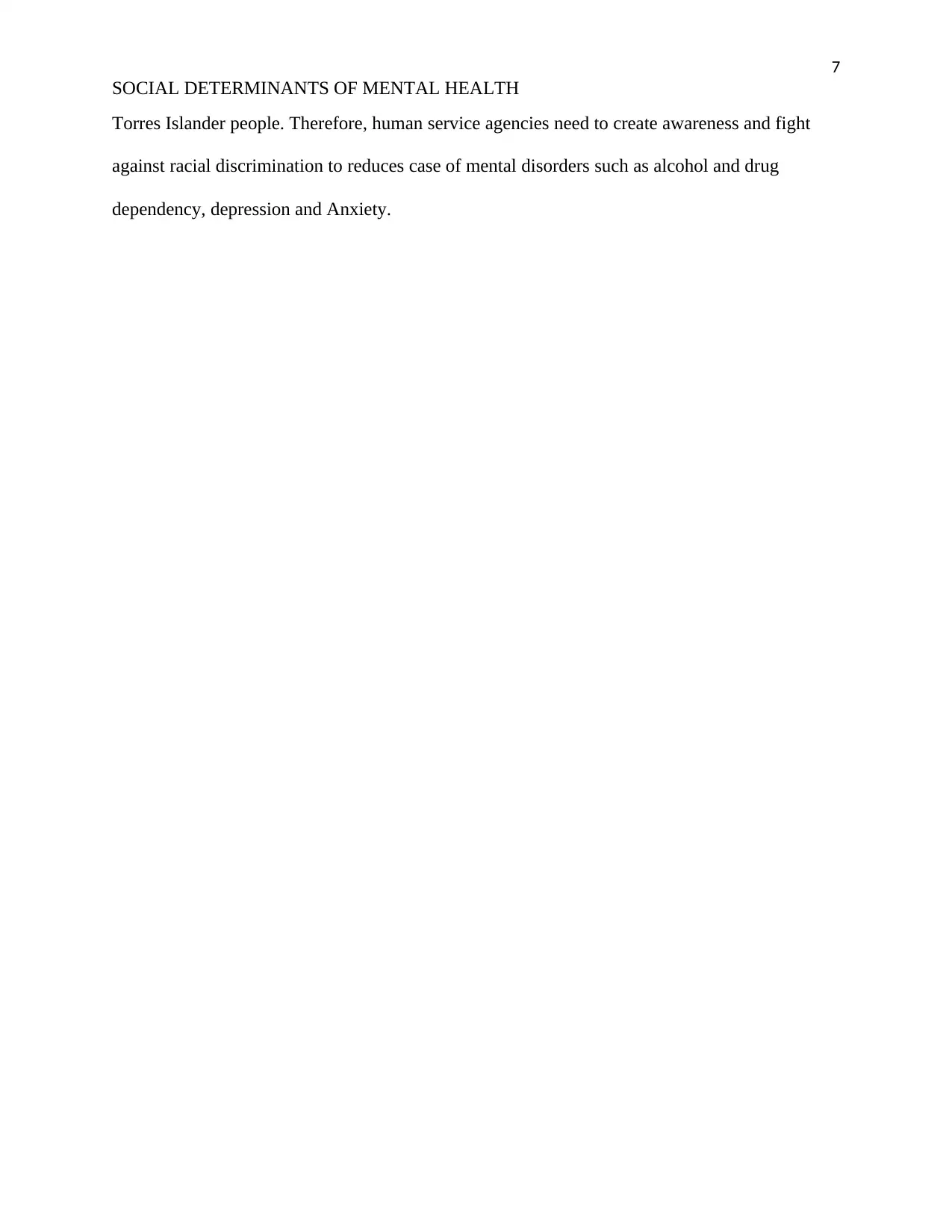
7
SOCIAL DETERMINANTS OF MENTAL HEALTH
Torres Islander people. Therefore, human service agencies need to create awareness and fight
against racial discrimination to reduces case of mental disorders such as alcohol and drug
dependency, depression and Anxiety.
SOCIAL DETERMINANTS OF MENTAL HEALTH
Torres Islander people. Therefore, human service agencies need to create awareness and fight
against racial discrimination to reduces case of mental disorders such as alcohol and drug
dependency, depression and Anxiety.
Paraphrase This Document
Need a fresh take? Get an instant paraphrase of this document with our AI Paraphraser
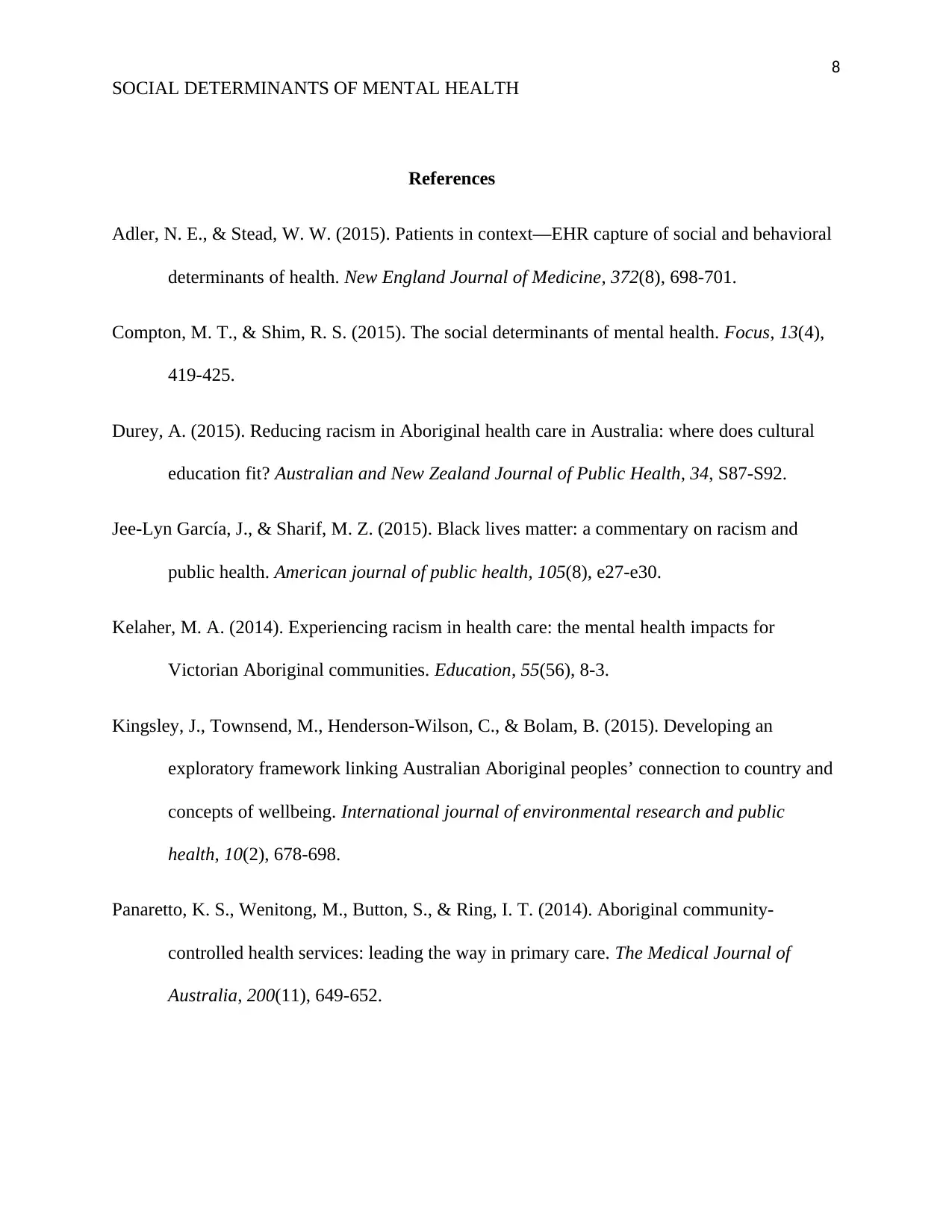
8
SOCIAL DETERMINANTS OF MENTAL HEALTH
References
Adler, N. E., & Stead, W. W. (2015). Patients in context—EHR capture of social and behavioral
determinants of health. New England Journal of Medicine, 372(8), 698-701.
Compton, M. T., & Shim, R. S. (2015). The social determinants of mental health. Focus, 13(4),
419-425.
Durey, A. (2015). Reducing racism in Aboriginal health care in Australia: where does cultural
education fit? Australian and New Zealand Journal of Public Health, 34, S87-S92.
Jee-Lyn García, J., & Sharif, M. Z. (2015). Black lives matter: a commentary on racism and
public health. American journal of public health, 105(8), e27-e30.
Kelaher, M. A. (2014). Experiencing racism in health care: the mental health impacts for
Victorian Aboriginal communities. Education, 55(56), 8-3.
Kingsley, J., Townsend, M., Henderson-Wilson, C., & Bolam, B. (2015). Developing an
exploratory framework linking Australian Aboriginal peoples’ connection to country and
concepts of wellbeing. International journal of environmental research and public
health, 10(2), 678-698.
Panaretto, K. S., Wenitong, M., Button, S., & Ring, I. T. (2014). Aboriginal community-
controlled health services: leading the way in primary care. The Medical Journal of
Australia, 200(11), 649-652.
SOCIAL DETERMINANTS OF MENTAL HEALTH
References
Adler, N. E., & Stead, W. W. (2015). Patients in context—EHR capture of social and behavioral
determinants of health. New England Journal of Medicine, 372(8), 698-701.
Compton, M. T., & Shim, R. S. (2015). The social determinants of mental health. Focus, 13(4),
419-425.
Durey, A. (2015). Reducing racism in Aboriginal health care in Australia: where does cultural
education fit? Australian and New Zealand Journal of Public Health, 34, S87-S92.
Jee-Lyn García, J., & Sharif, M. Z. (2015). Black lives matter: a commentary on racism and
public health. American journal of public health, 105(8), e27-e30.
Kelaher, M. A. (2014). Experiencing racism in health care: the mental health impacts for
Victorian Aboriginal communities. Education, 55(56), 8-3.
Kingsley, J., Townsend, M., Henderson-Wilson, C., & Bolam, B. (2015). Developing an
exploratory framework linking Australian Aboriginal peoples’ connection to country and
concepts of wellbeing. International journal of environmental research and public
health, 10(2), 678-698.
Panaretto, K. S., Wenitong, M., Button, S., & Ring, I. T. (2014). Aboriginal community-
controlled health services: leading the way in primary care. The Medical Journal of
Australia, 200(11), 649-652.
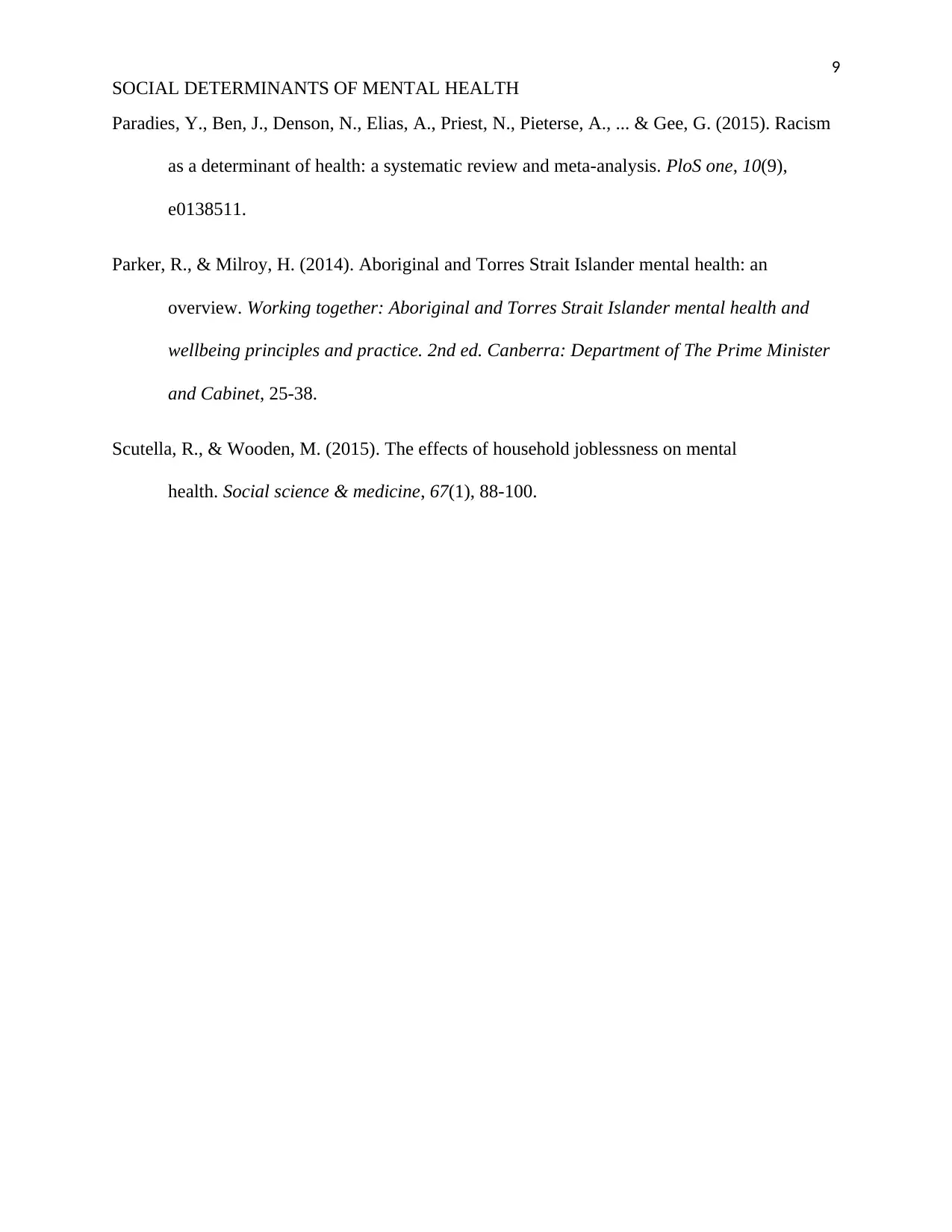
9
SOCIAL DETERMINANTS OF MENTAL HEALTH
Paradies, Y., Ben, J., Denson, N., Elias, A., Priest, N., Pieterse, A., ... & Gee, G. (2015). Racism
as a determinant of health: a systematic review and meta-analysis. PloS one, 10(9),
e0138511.
Parker, R., & Milroy, H. (2014). Aboriginal and Torres Strait Islander mental health: an
overview. Working together: Aboriginal and Torres Strait Islander mental health and
wellbeing principles and practice. 2nd ed. Canberra: Department of The Prime Minister
and Cabinet, 25-38.
Scutella, R., & Wooden, M. (2015). The effects of household joblessness on mental
health. Social science & medicine, 67(1), 88-100.
SOCIAL DETERMINANTS OF MENTAL HEALTH
Paradies, Y., Ben, J., Denson, N., Elias, A., Priest, N., Pieterse, A., ... & Gee, G. (2015). Racism
as a determinant of health: a systematic review and meta-analysis. PloS one, 10(9),
e0138511.
Parker, R., & Milroy, H. (2014). Aboriginal and Torres Strait Islander mental health: an
overview. Working together: Aboriginal and Torres Strait Islander mental health and
wellbeing principles and practice. 2nd ed. Canberra: Department of The Prime Minister
and Cabinet, 25-38.
Scutella, R., & Wooden, M. (2015). The effects of household joblessness on mental
health. Social science & medicine, 67(1), 88-100.
⊘ This is a preview!⊘
Do you want full access?
Subscribe today to unlock all pages.

Trusted by 1+ million students worldwide
1 out of 9
Related Documents
Your All-in-One AI-Powered Toolkit for Academic Success.
+13062052269
info@desklib.com
Available 24*7 on WhatsApp / Email
![[object Object]](/_next/static/media/star-bottom.7253800d.svg)
Unlock your academic potential
Copyright © 2020–2025 A2Z Services. All Rights Reserved. Developed and managed by ZUCOL.





